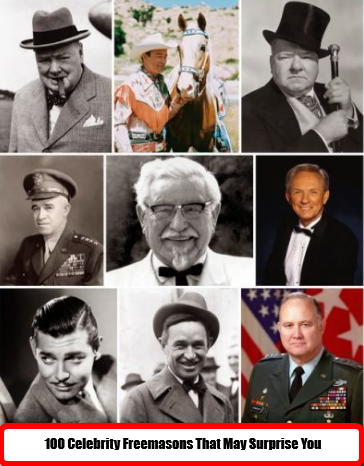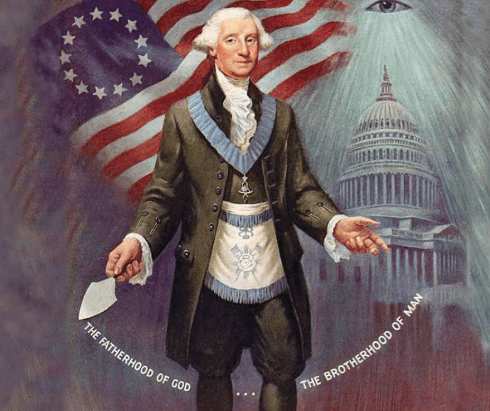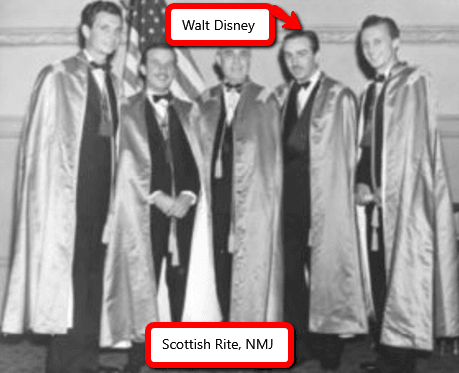
Famous Freemasons Today
- Freemasonry, with many famous individuals such as founding fathers and great world leaders being part of this secretive society, has had a significant impact on history.
- Celebrity Freemasons span various fields like entertainment, politics, and business, showcasing the diverse influence of Freemasonry.
- Understanding the history and principles of Freemasonry, many freemasons, founding fathers, spirituality, and possible interests can provide insights into the motivations and connections of prominent figures.
- Explore the list of 100 famous Freemasons to uncover the breadth of influence this organization has had on society.
- Surprising facts about celebrity Freemasons shed light on the hidden affiliations of well-known personalities and their interests in spirituality.
- Recognizing the presence of Freemasons in entertainment, politics, and business can offer a new perspective on the interconnectedness of influential circles with spirituality, interests, and family.
List of 100 Famous Freemasons Today

Notable Figures
Famous Freemasons span various fields, showcasing the diversity within the Masonic brotherhood. From politics to entertainment, their influence is profound!
Political Leaders
- Winston Churchill
- George Washington
- Benjamin Franklin
- Harry S. Truman
- Andrew Jackson
- James Monroe
- John A. Macdonald
- Salvador Allende
- Giuseppe Garibaldi
- Simon Bolivar
- Edward VII
- Franklin D. Roosevelt
- Joseph Smith
- John Wayne
- Thurgood Marshall
- J. Edgar Hoover
- Henry Ford
- Buzz Aldrin
- Mark Twain
- Rudyard Kipling
Entertainers
- John Wayne
- Wolfgang Amadeus Mozart
- Nat King Cole
- Duke Ellington
- Harry Houdini
- Irving Berlin
- Richard Pryor
- Clark Gable
- Peter Sellers
- Richard Pryor
- George M. Cohan
- Roy Rogers
- Mel Blanc
- Count Basie
- Burl Ives
- Ring Lardner Jr.
- Danny Thomas
- John Philip Sousa
Writers and Thinkers
- Mark Twain
- Voltaire
- Sir Arthur Conan Doyle
- Robert Burns
- Rudyard Kipling
- Oscar Wilde
- Benjamin Franklin
- Sir Walter Scott
- Alexandre Dumas
- Johann Wolfgang von Goethe
- H.G. Wells
- Jonathan Swift
- Edgar Allan Poe
- Sir Winston Churchill
- Victor Hugo
- Washington Irving
- Giuseppe Garibaldi
- Aleister Crowley
- Jean-Jacques Rousseau
- John Steinbeck
Inventors and Scientists
- Benjamin Franklin
- Alexander Fleming
- Sir Isaac Newton
- George Washington Carver
- Alessandro Volta
- John Montagu, 4th Earl of Sandwich
- Edward Jenner
- Thomas Edison
- Samuel Morse
- Joseph-Ignace Guillotin
- John Glenn
- Buzz Aldrin
- Mark Twain
- Rudyard Kipling
- Robert Burns
- Wolfgang Amadeus Mozart
- Giuseppe Garibaldi
- Jean-Jacques Rousseau
- Voltaire
- Johann Wolfgang von Goethe
Royalty and Nobility
- King Edward VII of the United Kingdom
- King George IV of the United Kingdom
- King George VI of the United Kingdom
- King George V of the United Kingdom
- King Gustaf VI Adolf of Sweden
- King Haakon VII of Norway
- King Haakon VIII of Norway
- King Hussein of Jordan
- King Juan Carlos I of Spain
- King Leopold I of Belgium
- King Leopold II of Belgium
- King Olav V of Norway
- King Umberto II of Italy
- King Willem-Alexander of the Netherlands
- King William IV of the United Kingdom
- Prince Arthur, Duke of Connaught and Strathearn
- Prince Edward, Duke of Kent and Strathearn
- Prince Philip, Duke of Edinburgh
- Prince William, Duke of Cambridge
- Prince Michael of Kent
Explorers and Adventurers
- Sir Richard Francis Burton
- Lewis and Clark
- Roald Amundsen
- John Glenn
- Robert Peary
- James Cook
- John Hanning Speke
- Sir Walter Raleigh
- Charles Lindbergh
- Ferdinand Magellan
- David Livingstone
- Sir Francis Drake
- Hernán Cortés
- Henry Morton Stanley
- Sir Edmund Hillary
- Captain James Cook
- Matthew Henson
- Lance Armstrong
- Captain Kid (AKA – Cap Blackbeard)
Athletes
- Ty Cobb
- Arnold Palmer
- Sugar Ray Robinson
- Jesse Owens
- Jack Dempsey
- Cy Young
- John Elway
- Shaquille O’Neal
- Jim Thorpe
- Sugar Ray Leonard
- Michael Richards
- Greg Maddux
- Harry Wright
- Red Grange
- John L. Sullivan
- Tris Speaker
- George Mikan
- Paul Brown
- Joe Louis
- Tom Mix
Understanding Freemasonry

Origins
Freemasonry dates back to the late 16th century, with its roots in the stonemason guilds of the Middle Ages. The organization evolved into a fraternity focused on moral and spiritual values.
Core Principles
Freemasonry is founded on principles of brotherly love, relief, and truth. Members, including masons, are encouraged to uphold these values in their daily lives. The organization emphasizes charity and community service.
Structure
Freemasonry operates through lodges, which are local chapters where members meet regularly. Each lodge, led by officers such as the Worshipful Master, follows a hierarchical structure, focusing on the spirit and body of masons in ceremonies and meetings.
Rituals and Symbols
Rituals play a significant role in Freemasonry, often involving symbolic gestures and ceremonies that convey moral lessons. Symbols, like the square and compasses, represent moral concepts that guide masons’ behavior.
Membership
To become a Freemason, individuals must meet certain criteria, including belief in a higher power and good moral character. Prospective members go through an initiation process that involves symbolic rituals.
Secrecy
Freemasonry is known for its secretive nature, with rituals and teachings kept private within the organization. This secrecy has led to various conspiracy theories and speculation about its true intentions.
The Impact of Freemasons in History
Influence on Revolutionary Movements
Freemasons have played a significant role in shaping revolutionary movements throughout history. For example, prominent figures like George Washington and Benjamin Franklin were members of the fraternity. Their involvement in Freemasonry influenced their ideologies and leadership styles.
The impact of Freemasons on revolutionary movements can be seen in the values they upheld, such as liberty, equality, and fraternity. These principles were reflected in their actions and decisions, contributing to the success of various revolutions.
Architectural Contributions
Freemasons have also made substantial contributions to architecture. Many iconic structures around the world, such as the Washington Monument and the United States Capitol, were built by Freemasons. Their expertise in architectural design and construction techniques has left a lasting legacy.
The architectural influence of Freemasons extends beyond just buildings. Their symbolic use of geometric shapes and ancient motifs can be observed in various structures, adding layers of meaning and significance to architectural masterpieces.
Cultural and Social Impact
In addition to their political and architectural influence, Freemasons have had a profound impact on culture and society. The fraternity’s emphasis on moral values, charity, and personal development has shaped individuals and communities for centuries.
Freemasonry has also served as a platform for intellectual exchange and camaraderie among members. Through rituals, symbols, and traditions, Freemasons have created a unique cultural identity that continues to resonate with many people worldwide.
Surprising Facts About Famous Freemasons Today

Notable Figures
Many celebrity Freemasons have left a lasting impact on various fields, from entertainment to politics.
George Washington, Benjamin Franklin, and Winston Churchill were all notable figures who were also Freemasons. George Washington, the first President of the United States, was initiated as a Freemason in 1752 and played a significant role in the establishment of Freemasonry in America. Benjamin Franklin, a Founding Father of the United States, was also a Freemason and served as the Grand Master of Pennsylvania. Winston Churchill, the Prime Minister of the United Kingdom during World War II, was initiated into Freemasonry in 1901 and remained an active member throughout his life. These three men not only made significant contributions to their respective fields but also left a lasting impact on the Freemasonry community.
Influence in Hollywood
Famous freemasons today have long been part of the Hollywood scene. Actors such as John Wayne and Clark Gable were members of this secretive fraternity, adding an air of mystery to their already glamorous personas.
Other notable Hollywood influencers who were Freemasons include Walt Disney, Bob Hope, and Douglas Fairbanks. These individuals not only left a mark on the entertainment industry but also had ties to this ancient fraternal organization, further adding to the intrigue surrounding their lives. Freemasonry’s influence in Hollywood goes beyond just a few actors, with directors, producers, and even studio executives being part of this secretive society. The connections and networks formed within Freemasonry likely played a role in shaping the landscape of the entertainment industry, making it a fascinating aspect to explore when delving into the history of Hollywood.
Diverse Backgrounds
Contrary to popular belief, celebrity Freemasons come from diverse backgrounds. From musicians like Wolfgang Amadeus Mozart to inventors like Alexander Graham Bell, the influence of Freemasonry extends across various disciplines.
Wolfgang Amadeus Mozart, the famous composer, was also a Freemason. He joined the Masonic lodge in Vienna in 1784 and became an active member of the fraternity. Mozart’s involvement in Freemasonry influenced his compositions, with Masonic themes and symbolism often appearing in his music. His opera “The Magic Flute” is a notable example of this, as it contains many Masonic elements and messages. Mozart’s membership in the Freemasons was an important part of his life and career, showcasing the diverse backgrounds of those involved in the fraternity.
Secret Symbols and Rituals
Freemasonry is shrouded in secrecy, with celebrity Freemasons often participating in elaborate rituals and ceremonies. The use of symbols like the square and compass adds an intriguing layer to their membership.
Brotherhood Bonds
One of the most intriguing aspects of being a celebrity Freemason is the strong bond shared among members. This brotherhood transcends fame and fortune, creating a sense of camaraderie that lasts a lifetime.
Freemasons in Entertainment
Famous Freemason Actors
Many famous actors have been part of Freemasonry, including John Wayne and Clark Gable. These actors embraced the values of brotherhood and charity promoted by the organization.
Freemason Influence on Hollywood
Freemasonry’s influence on Hollywood can be seen in various movies and TV shows. For instance, the movie “National Treasure” showcases Masonic symbols and themes throughout the plot.
“National Treasure” is not the only movie that showcases Freemasonry’s influence in Hollywood. The film industry has a long history of incorporating Masonic symbols and themes into various plots, adding an air of mystery and intrigue to the stories. In “National Treasure,” the protagonist follows a series of clues left by the Freemasons, highlighting their role in shaping history and secret societies. The movie delves into the idea of hidden treasures and ancient knowledge guarded by the Freemasons, further perpetuating the mystique surrounding the organization. The portrayal of Freemasonry in “National Treasure” adds an element of excitement and adventure to the film, captivating audiences with the allure of secret societies and historical conspiracies.
More Famous Freemasons Today & Their Impact on the Music Industry
In the music industry, several artists have been associated with Freemasonry. Notable musicians like Wolfgang Amadeus Mozart and Duke Ellington were known Freemasons. See more artist below:
- Jay-Z
- Snoop Dogg
- Drake
- Tim McGraw
- Willie Nelson
- George Strait
- Johnny Cash
- Roy Acuff
- Merle Haggard
- Scotty Moore
- Nat King Cole
- Count Basie
- Duke Ellington
- Irving Berlin
- W.C. Handy
- Beethoven
- Haydn
- Liszt
Freemason Writers and Directors
Writers and directors in the entertainment industry have also been linked to Freemasonry. For example, Rudyard Kipling, famous for “The Jungle Book,” was a prominent Freemason.
Freemasons in Politics
Influence on Political Systems
Freemasons have historically held influential positions in political systems, shaping policies and decisions. Their network has been known to transcend borders, fostering alliances and collaborations among members worldwide. This influence extends to various levels of government, from local councils to national administrations.
Notable Freemason Politicians
Freemasonry is a centuries-old secret society that has attracted many influential figures, not just politicians. It is known for its rituals, symbols, and principles that promote brotherhood, charity, and personal growth. Freemasons believe in the importance of moral values and strive to make positive contributions to their communities.
George Washington, the first President of the United States, was not only a key figure in the American Revolution but also a dedicated Freemason. He believed in the ideals of Freemasonry, such as equality and freedom of thought. Benjamin Franklin, one of the Founding Fathers of the United States, was also a notable Freemason who valued the organization’s teachings on self-improvement and enlightenment.
Winston Churchill, the former Prime Minister of the United Kingdom, was another prominent Freemason who found inspiration in the fraternity’s principles of integrity and service. These leaders exemplified the values of Freemasonry through their actions and leadership roles in their respective countries.
The influence of Freemasonry extends beyond politics, with many celebrities also being members of the fraternity. From actors to musicians, Freemasonry has attracted individuals from various fields who are drawn to its traditions and values. Some well-known celebrity Freemasons include Mozart, Mark Twain, and Buzz Aldrin.
In conclusion, Freemasonry has played a significant role in shaping the lives of many influential individuals throughout history. Its emphasis on moral values, charity, and personal development continues to attract people from diverse backgrounds who seek to make a positive impact on society.
Impact on Policy Making
The values and principles upheld by Freemasonry often reflect in the policies advocated by Masonic politicians. Concepts such as equality, liberty, and fraternity are commonly integrated into their decision-making processes. This influence can be seen in initiatives promoting social welfare, human rights, and democratic governance.
Freemasons in Business
Key Figures
Many prominent figures in the business world have been part of the Freemasons, including Henry Ford and Walt Disney.
Freemasonry has a long history of attracting successful individuals who have made significant contributions to various industries. Notable business leaders such as Henry Ford, founder of Ford Motor Company, and Walt Disney, the visionary behind Disneyland and Walt Disney World, were proud members of the Freemasons. These influential figures incorporated Masonic principles into their business practices, emphasizing values like integrity, charity, and brotherhood.
Ethical Business Practices
Freemasonry emphasizes ethical business practices that prioritize honesty, integrity, and fairness.
One of the core principles of Freemasonry is the importance of ethical conduct in all aspects of life, including business dealings. Members are encouraged to uphold high moral standards and adhere to values such as honesty, integrity, and fairness in their professional endeavors. This emphasis on ethical behavior has influenced many Freemasons to become respected leaders known for their commitment to upholding moral values in the business world.
Networking Opportunities
Freemasonry provides valuable networking opportunities for members involved in various industries.
Being part of the Freemasons offers members unique networking opportunities that can be beneficial for their careers. Through Masonic lodges and events, members can connect with other professionals from diverse backgrounds and industries. This networking environment fosters collaboration, knowledge sharing, and mentorship among like-minded individuals who share a commitment to personal growth and community service.
Philanthropic Initiatives
Freemasons engage in philanthropic initiatives that benefit communities worldwide.
Philanthropy is a fundamental aspect of Freemasonry, with members actively participating in charitable activities that aim to improve the lives of others. From supporting local schools and hospitals to funding disaster relief efforts globally, Freemasons are dedicated to making a positive impact on society through their philanthropic endeavors. By contributing time, resources, and expertise to various causes, Freemasons demonstrate their commitment to serving others and creating a better world for all.
The Influence of Freemasonry Today
Modern Practices
Freemasonry continues to impact various aspects of society, including charity work and community involvement. Lodges often engage in philanthropic activities, supporting local causes and charities.
Masonic Symbols
Within Freemasonry, symbols play a crucial role in conveying moral lessons and values. The use of symbols, such as the square and compass, serves as reminders of ethical principles.
Membership Criteria
Becoming a Freemason involves meeting certain criteria, such as having a belief in a Supreme Being, displaying good moral character, and expressing a commitment to self-improvement. Simply ask one to be one!
Global Reach
Freemasonry is not limited to a specific region but has a global presence. Lodges can be found worldwide, fostering connections and unity among members from diverse backgrounds.
Secrecy vs. Transparency
While Freemasonry is often associated with secrecy, there has been a shift towards greater transparency in recent years. Many lodges now embrace openness about their activities and values.
Closing Thoughts
You’ve delved into the world of celebrity Freemasons, uncovering their influence across history, entertainment, politics, and business. The list of 100 famous Freemasons has shed light on the significant impact these individuals have had on society. Surprising facts have added a layer of intrigue to your understanding, showcasing the depth of Freemasonry’s reach in various fields. As you explore further, remember that Freemasonry continues to shape our world today, with its principles and values resonating through time.
Take this newfound knowledge and reflect on how Freemasonry’s legacy intertwines with our daily lives. Whether you’re intrigued by history, fascinated by celebrities, or curious about societal influences, the realm of Freemasonry offers a rich tapestry worth exploring. Embrace this journey of discovery and consider how these insights can enrich your perspective on the world around you.
Frequently Asked Questions
What is Freemasonry all about?
Freemasonry is a fraternal organization that promotes moral and personal development through symbolic rituals. It emphasizes brotherhood, charity, and community service.
Who are some famous Freemasons in history?
Prominent historical figures who were Freemasons include George Washington, Benjamin Franklin, Mozart, and Winston Churchill. Their membership in the fraternity influenced their lives and legacies.
Are there any celebrity Freemasons today?
Yes, many celebrities are known to be Freemasons, such as actors John Wayne and Clark Gable, as well as musicians like Duke Ellington. Being a Freemason can provide a sense of belonging and shared values in the entertainment industry.
How has Freemasonry impacted politics?
Throughout history, Freemasons have played significant roles in politics worldwide. They have advocated for democratic principles, religious tolerance, and social progress. Many political leaders have been influenced by Masonic values.
What role do Freemasons play in business?
Freemasonry fosters ethical behavior and integrity among its members, which can positively impact their professional lives. Networking opportunities within the fraternity can also help members advance their careers through mutual support.












